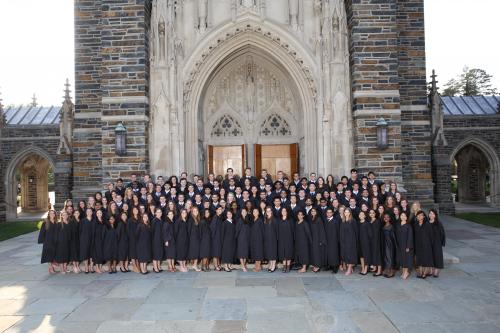
Affiliated Programs

Academic Engagement and Fellowship
Housed within OUSF are a variety of programs Duke University that encourage academic engagement among students. Students come from diverse backgrounds and have widely differing academic and professional goals, but are united in their desire to engage with intellectual communities during their time at Duke. Affiliated programs include women's learning and housing communities, faculty lecture series, scholarly opportunities for future health professionals, and research initiatives.
Baldwin Scholars
Inspiring and supporting undergraduate women to become engaged, confident and connected leaders in the Duke community and beyond
The four-year experience includes a retreat, two academic seminars, an opportunity to live together as a group on West Campus, an internship, and numerous informal activities such as lectures and dinners. Baldwin Scholars will develop leadership, critical thinking and problem-solving skills. The program is open to students in the Trinity College of Arts & Sciences and the Pratt School of Engineering.
Bassett Scholars
Encourges students to develop radical empathy, find unity in diversity, and identify shared values and interests.
Named after the ardent crusader for free speech and academic freedom in the early 20th Century, John Spencer Bassett Scholars are committed to exploring, engaging, and articulating specific views and epistemologies—enhancing cultural, religious, intellectual, and political diversity.
Mellon Mays Undergraduate Fellowship
Expanding access to and opportunities in the US academy and shaping the future of the humanities
Established in 1988, the Mellon Mays Undergraduate Fellowship (MMUF) is committed to expanding academic faculties and leadership in higher education and to promoting the value of the humanities and related disciplines. MMUF emphasizes mentoring, research support, programming, and student cohort building to and support students of great promise in the humanities and qualitative social sciences, and to help them become scholars and professionals of the highest distinction.
Phi Beta Kappa
The nation's oldest academic honor society
The abridged history of our chapter, presented below, is taken from Carl L. Anderson's history of Phi Beta Kappa at Duke. This work was written in 1977 and revised in 1978, 1980, and 1988. "The Duke chapter, Beta of North Carolina, was formed in 1920 at Trinity College, Durham, on the application of eight faculty members who has been inducted into membership while they were students at other institutions. The statement prepared in support of Trinity's application was pleased to point out that the college had no fewer than eleven buildings, including a library of 54,000 volumes staffed by six librarians.
"To meet the requirement that alumni of the College included persons who had attained great distinction, the charter application named United States Senators and Congressmen, college presidents, and others, including John Spencer Bassett, Professor of History in Trinity College. Basset had been the center of a celebrated controversy at Trinity in 1903 that led to one of the earliest affirmations of academic freedom by the trustees of an American institution of learning..."
Rachel Carson Scholars Program
Provides Duke University undergraduate students with direct research experience in marine science and conservation
The Rachel Carson Scholars Program provides Duke University undergraduate students with direct research experience in marine science and conservation. Named in honor of Rachel Carson—a marine biologist, author, and conservationist whose work advanced the global environmental movement—scholars will acquire the necessary skills to be the next generation of marine conservation leaders.
Scholars are trained through small seminar experiences, experiential learning, enhanced faculty-student mentorship, scientific research, and professional development. All scholars spend at least one semester at the Duke University Marine Laboratory (DUML) and have funding available for research, travel to professional conferences, and DUML travel courses. In addition to the training that they receive, a community of scholars will be developed both within each cohort of scholars and among alumni of the program.